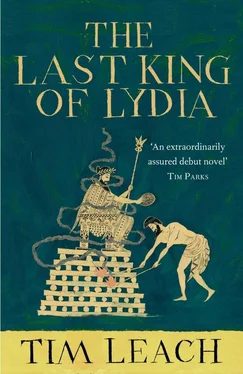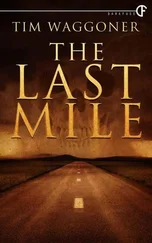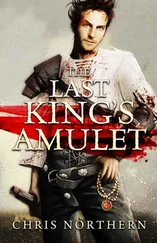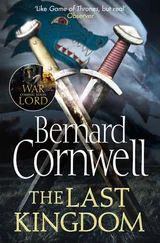Tim Leach - The Last King of Lydia
Здесь есть возможность читать онлайн «Tim Leach - The Last King of Lydia» весь текст электронной книги совершенно бесплатно (целиком полную версию без сокращений). В некоторых случаях можно слушать аудио, скачать через торрент в формате fb2 и присутствует краткое содержание. Год выпуска: 2013, ISBN: 2013, Издательство: Atlantic Books Ltd, Жанр: Исторические приключения, на английском языке. Описание произведения, (предисловие) а так же отзывы посетителей доступны на портале библиотеки ЛибКат.
- Название:The Last King of Lydia
- Автор:
- Издательство:Atlantic Books Ltd
- Жанр:
- Год:2013
- ISBN:9780857899200
- Рейтинг книги:5 / 5. Голосов: 1
-
Избранное:Добавить в избранное
- Отзывы:
-
Ваша оценка:
- 100
- 1
- 2
- 3
- 4
- 5
The Last King of Lydia: краткое содержание, описание и аннотация
Предлагаем к чтению аннотацию, описание, краткое содержание или предисловие (зависит от того, что написал сам автор книги «The Last King of Lydia»). Если вы не нашли необходимую информацию о книге — напишите в комментариях, мы постараемся отыскать её.
The Last King of Lydia — читать онлайн бесплатно полную книгу (весь текст) целиком
Ниже представлен текст книги, разбитый по страницам. Система сохранения места последней прочитанной страницы, позволяет с удобством читать онлайн бесплатно книгу «The Last King of Lydia», без необходимости каждый раз заново искать на чём Вы остановились. Поставьте закладку, и сможете в любой момент перейти на страницу, на которой закончили чтение.
Интервал:
Закладка:
‘Thank you, Croesus. Enjoy your freedom, for a day at least.’ He paused. ‘I can never free you fully,’ he added. ‘I am sorry for that.’
‘I know.’ Croesus tried to smile. ‘It doesn’t matter. I don’t care any more.’
He left the king and passed down through the palace, searching for Isocrates.
Everywhere he went, he saw Cyrus’s people at work, once again trying to understand the business of a flawed, alien government. Through doorways that had been carelessly left open or torn from their hinges in the attack, he saw ministers hunched over desks with translators at their sides. Some studied the treaties the city had signed with its neighbours, trying to untangle the knots of alliances and enmities that had built up over centuries of war and diplomacy. Others wrestled with the city’s strange, obscure, and barbaric system of justice, noting down laws that should be repealed and those that needed to be enacted to establish Babylon as a civilized part of the empire. The most harassed-looking Persians were those who examined tax receipts and records of expenditure, where, inevitably, the latter was greater than the former by several orders of magnitude. They shook their heads over the profligacy of their predecessors, trying to draw the numbers closer together, to prevent the indebted city from collapsing in on itself.
Elsewhere, guards explored the corridors of the palace and recorded its layout on wax tablets, identifying the paths that an assassin might take, the positions that soldiers could hold secure in the event of invasion or insurrection, the routes by which a monarch could quietly slip out of the palace if it became necessary to make a discreet exit: the palace redrawn as a labyrinth of potential violence.
Croesus observed Persian servants talking animatedly to Babylonian slaves, unable to speak each other’s languages yet communicating their needs through tone and gesture. He almost laughed when he saw one give an unmistakable, uncanny impersonation of Harpagus. He imagined the essentials were simple enough to communicate without words. Good masters, cruel masters, stupid masters. The rest was just so much detail.
Several times he stopped and asked the Persian servants to help him find his friend. They stared at him in silence, and the Babylonians mimicked this unspoken aggression. That he was not one of them, that he was neither a master to command nor an equal to be aided, was, it seemed, another concept that could cross the boundaries of language.
He eventually found Isocrates in one of the cellars. After Croesus had told him of Cyrus’s reward, he sat down on a sack of barley. He did not speak for a time.
‘I don’t want to go,’ he said quietly.
‘What? You must be joking.’
Isocrates offered him a thin smile. ‘I don’t know what I would do as a free man,’ he said. ‘I am not scared of much. But that does scare me.’ He laughed. ‘A day without being at another’s command? I think I might go mad.’
‘I don’t believe that. You are not as weak as that.’
‘No. Perhaps you are right. Perhaps I am afraid that I would like it too much. If I can have only one day of freedom, I would rather not have any at all.’
‘You are sure?’
‘I am quite sure.’ He hesitated.
‘Something more you want to say?’
‘Yes.’ But he paused for a long time before he spoke again. ‘Take Maia, will you?’
‘Maia?’
‘Yes. Take her out into the city.’
‘You don’t think she will feel the same way as you?’
Isocrates smiled. ‘No. She is stronger than I am. Smarter, too. She will take it for what it is. A day of freedom. Nothing more.’
‘Very well.’ Croesus gestured to the heavy bags that filled the cellar. ‘You have plenty of work ahead of you, anyway.’
‘Yes. A grain counter in the most fertile land in the world.’ He laughed. ‘How could I take a day off? There is more wealth in bread here than you ever had in gold, Croesus. I could count it for the rest of my life and still not finish before I died.’
Croesus hesitated, struck by a thought. ‘How old are you, Isocrates?’
‘I don’t know.’
‘How can you not know?’
‘You forget what I am.’
‘And what is that?’
‘Irrelevant,’ he said. ‘No royal celebrations marked my birth, Croesus. No priests inscribed the date in their annals. I honestly don’t know how many years I have lived. I am a little younger than you, perhaps, but not by much. We are both getting old now.’
‘That is strange,’ Croesus said. ‘Perhaps I envy you. All I see is my age increasing. The time that remains to me ebbing away. Knowing the date of your birth is almost like knowing the day you will die.’
‘Well, you have one day back. A day of freedom. Go and enjoy yourself, Croesus. There won’t be any more after this one.’
‘How do you know? Perhaps Cyrus will reward us again.’
Isocrates paused. ‘I had a dream last night.’
‘I thought slaves didn’t dream.’
‘I don’t, usually. Perhaps I knew this reward was coming, this little piece of freedom, and took it in my sleep instead.’ He picked a handful of barley from the sack at his side, and let it run through his fingers like sand. ‘Do you believe in the truth of dreams?’
‘I don’t know. What was your dream?’
‘I dreamed that I was back on Thera. I wish I could show my island to you, Croesus. The red cliffs, the way they plunge straight down, like a diver into the sea. When the sun sets, it is like watching a great golden coin melting into the water, and the sky seems to catch fire. I’ve never been anywhere more beautiful than that.’
‘When were you taken from there?’
‘When I was a child. In my dream, I was in my village in the west of the island. The cliff below my village is near vertical, but there are steps, cut or worn by gods or men, that go down to the water. And down there is the port. My father was a fisherman, I think. He used to take me there and teach me knots.’
‘Were you a boy in this dream?’
‘No. I was as I am now. I went down the steps, but there were no ships in the bay, no fishermen sorting nets or dogs begging for rotten fish. There was only a woman, bathing naked. She was beautiful. A goddess, I suppose. I apologized for interrupting her-’
Croesus laughed.
‘It’s true, I promise you,’ Isocrates said. ‘What else can you do if you come across a goddess bathing? But she just looked at me in silence. She seemed to be waiting for me to ask her something.’
‘What did you ask her?’
‘I had the feeling that whatever question I asked her, she would answer it truthfully. And I knew that there was some question, the right question, that I should put to her. But I couldn’t think of it. All I could think to ask, standing beneath those cliffs, was whether or not I would ever find my way back to my village in the waking world.’
‘What did she say to that?’
‘She looked a little disappointed. She smiled nonetheless. She told me that I would live long, and travel far, but that I would never see my home again.’
‘And that was the end of your dream?’
‘Not quite.’ Isocrates turned to look at his companion, a smile playing on his lips. ‘I told her I had a friend,’ he said. ‘I asked her if she had anything to say to him.’
Croesus laughed, a soft and rueful sound. ‘Now I don’t know whether you are lying to me or not. I can never tell. If it is true, I wish you hadn’t, I haven’t had much luck with oracles in the past.’
‘Don’t you want to hear what she said?’
‘Very well. What did this naked goddess have to say about my future?’
‘She said that you would live long as well. But that you would never be happier than this day that is to come. That is when I woke up.’ Isocrates waited for Croesus to reply, but the other man said nothing. ‘What if that were true? What would you do then?’
Читать дальшеИнтервал:
Закладка:
Похожие книги на «The Last King of Lydia»
Представляем Вашему вниманию похожие книги на «The Last King of Lydia» списком для выбора. Мы отобрали схожую по названию и смыслу литературу в надежде предоставить читателям больше вариантов отыскать новые, интересные, ещё непрочитанные произведения.
Обсуждение, отзывы о книге «The Last King of Lydia» и просто собственные мнения читателей. Оставьте ваши комментарии, напишите, что Вы думаете о произведении, его смысле или главных героях. Укажите что конкретно понравилось, а что нет, и почему Вы так считаете.












